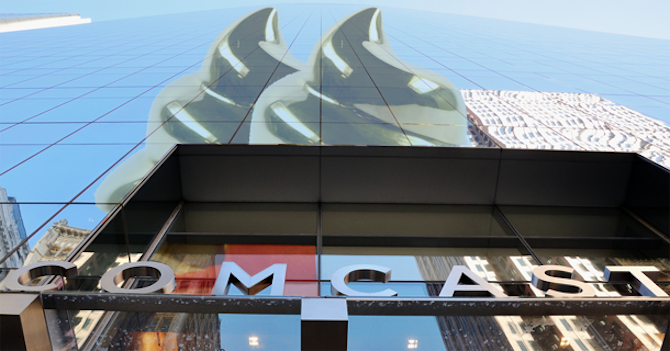Dish, Consumer Advocates Ask FCC To Block Comcast/TWC Merger As Final Comment Deadline Hits
Many members of the Stop Mega Comcast Coalition in particular filed response comments, but the filing from pay TV company (and Comcast competitor) Dish Network stands out as particularly adamant.
In their 266-page filing (PDF), Dish breaks down all the problems into ten main buckets and then takes a deep dive into each of them. The general arguments are the same they’ve been since February: that Comcast already has the ability and the incentive to cause harm to both competition and consumers, and that merging with Time Warner Cable will make it much more likely not only that everyone who has to deal with the cable giant directly will somehow suffer, but that ripple effects through all the relevant industries will have an impact on virtually everyone in the country.
And it’s not just one or two things that Comcast could easily avoid doing. Dish executive Jeffrey Blum said the filing includes descriptions of “at least 53” different ways that a merged Comcast could sabotage competition from both traditional and online video providers, some of which are more subtle than others and all of which would at the very least result in lengthy (and expensive) court fights for smaller companies. Blum later added that carriage contract fights that blackout networks for Dish viewers — like their current dispute with Fox News — are likely to become even more frequent if Comcast gains even more market leverage by buying TWC.
Dish also particularly zeroes in on Comcast’s laughable claim that the current market, with its robust broadband competition, will somehow keep Comcast accountable if Comcast “were to misbehave by blocking or degrading [subscribers’] service.” Since competition is nil and options are absent for many of us, consumers who are fed up with Comcast’s service, behavior, or offerings don’t actually have anywhere else to go.
Instead, Dish writes, customers who go to Comcast tend to stay with Comcast even if they don’t want to. Comcast is “the Hotel California of broadband, an establishment guests can check into but never leave.”
Our colleagues down the hall at Consumers Union (the advocacy arm of Consumerist’s parent company, Consumer Reports) have also rejected Comcast’s arguments for the merger. They point out once again that Comcast’s “we don’t compete geographically and therefore competition is fine” argument is, as CU senior policy counsel George Slover put it in a call, “far too narrow a view of how competition works and what’s at stake here.”
Comcast has filed their own reply (PDF), and company mouthpiece David L. Cohen is of course on hand with the company’s standard talking points in rebuttal. For example, Cohen claims yet again that “critics’ assessment of Comcast’s broadband ‘share’ ignores the realities of DSL and wireless competition,” even though it’s really Comcast ignoring the reality of wireless broadband “competition”.
Cohen also writes, “Even when applying the speed threshold of 25 Mbps that some parties have insisted is the only relevant broadband speed, the transaction has no material impact on competition,” adding, “even at this high threshold, the combined company’s broadband share would increase by only one percent.” That, of course, conveniently ignores both that the derided party claiming 25 Mbps is the threshold to look at is in fact the chairman of the FCC, and that the existing near-complete absence of competition that will only change by “one percent” is exactly the problem that everyone is upset about to begin with.
The population of greater D.C. has all but drained away until the new year, but the FCC is expected to restart the review clock on the merger and pick up where they left off in mid-January.
Want more consumer news? Visit our parent organization, Consumer Reports, for the latest on scams, recalls, and other consumer issues.


